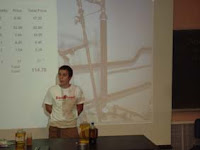"Based on December '04 to May '05 casualty figures (437 US deaths, 2431 Iraqi deaths, using the lowest published numbers), and Iraq's oil production that the US bought for the same period (3,304,000 barrels), and production efficiency of 50% converting raw oil into gas and diesel:
For those who only care about US deaths, that's 158,774 gallons of fuel per US citizen casualty in Iraq.
For those who care about Iraqi deaths, that's 28,542 gallons of fuel per Iraqi citizen killed in fighting in Iraq.
My wife and I use about 600 gallons of fuel each year. If we used fuel from Iraqi sources, we could drive 48 years before we're responsible for one Iraqi death, or 264 years before we're responsible for one US death in Iraq. Those prices are too high for me.
OK, "my" petroleum supply is from Canada or Montana, so why should I worry about Iraqi fuel? Because SOMEONE is using that fuel in the US. If I can use locally grown fuel sources (Canola grows very nicely here, and there's still abundant used cooking oil), that someone could be using the Canadian fuel, instead of Iraqi fuel.
I'd rather have a farmer's sweat on my hands than someone's blood.
That's my fuel philosophy in a nutshell.
Regards,
JohnO"



















